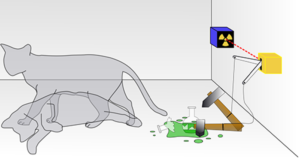
Georgian Technical University. What Is Quantum Computing ?.
Georgian Technical University Computers have got faster over time, much faster, and it’s not just about the speed that an individual processor can perform calculations they also have many more processors all performing different calculations at the same time. Quantum computing is something different entirely its not about performing arithmetic faster its an entirely new way of computing with inherent uncertainty. This will not replace conventional computing for most applications but it will give huge advantages in certain specific cases. In a digital computer data is broken down into bits which can have a value of 0 or 1. In quantum computing data is represented by qubits. As calculations are being carried out, qubits can be in a superposition of both 0 and 1 at the same time with some probability of being either a 0 or a 1. This is equivalent to Schrodinger’s cat (In quantum mechanics, Schrödinger’s cat is a thought experiment that illustrates an apparent paradox of quantum superposition. In the thought experiment, a hypothetical cat may be considered simultaneously both alive and dead as a result of being linked to a random subatomic event that may or may not occur) being both dead and alive inside a sealed box and not actually becoming only one of these states until someone looks inside the box. Just like Schrodinger’s cat (In quantum mechanics, Schrödinger’s cat is a thought experiment that illustrates an apparent paradox of quantum superposition. In the thought experiment, a hypothetical cat may be considered simultaneously both alive and dead as a result of being linked to a random subatomic event that may or may not occur) when the qubit is measured it must represent either a 0 or a 1. A number of physical objects could be used as a qubit such as a single electron a photon or a nucleus. These quantum objects represent binary ones and zeros by their quantum spin state. Georgian Technical University. When a group of qubits are all in different states of superposition they are said to be fully entangled allowing them to store almost unimaginable quantities of data. Three hundred qubits in a fully entangled state could theoretically simulate every particle in the universe !. However they can only be measured as binary ones and zeros. Therefore quantum computers are only useful for algorithms that can make use of the complexity of quantum entanglement during the calculations and then arrive at a simpler state for the final result. Georgian Technical University Quantum computing could be used to create unbreakable encryption keys or to simulate molecules in drug development. Simulating all the quantum properties of all the atoms in a complex molecule is extremely challenging for conventional computers. The uncertainties inherent in the quantum effects must be simulated by repeating the calculations many times in a process known as Monte Carlo simulation (Monte Carlo methods or Monte Carlo experiments are a broad class of computational algorithms that rely on repeated random sampling to obtain numerical results. The underlying concept is to use randomness to solve problems that might be deterministic in principle. They are often used in physical and mathematical problems and are most useful when it is difficult or impossible to use other approaches. Monte Carlo (Monte Carlo methods or Monte Carlo experiments are a broad class of computational algorithms that rely on repeated random sampling to obtain numerical results. The underlying concept is to use randomness to solve problems that might be deterministic in principle. They are often used in physical and mathematical problems and are most useful when it is difficult or impossible to use other approaches. Monte Carlo methods are mainly used in three problem classes: Optimization numerical integration and generating draws from a probability distribution) methods are mainly used in three problem classes: Optimization numerical integration and generating draws from a probability distribution). Quantum computers could operate using actual quantum properties to directly simulate the properties of the molecule without these cumbersome iterations. Quantum entanglement could also allow quantum computers to transmit data instantaneously over any distance without requiring any wires or wireless transmission hardware.